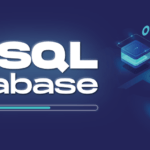SQL (Structured Query Language) databases have become an essential tool for managing, storing, and retrieving data in various applications. From small businesses to large enterprises, SQL databases are widely used due to their versatility, reliability, and scalability. In this beginner’s guide, we’ll delve into the fundamentals of SQL databases and explore their benefits and use cases.
What is an SQL Database?
- An SQL database is a type of relational database that stores data in a structured format and allows you to manipulate and retrieve that data using SQL. Unlike flat-file databases, SQL databases can store complex relationships between data and can handle multiple data types, such as text, numbers, and dates.
Benefits of SQL Databases
There are several key benefits to using an SQL database, including:
- Scalability: SQL databases can handle large amounts of data and can easily be scaled up as your data grows.
- Reliability: SQL databases provide robust and reliable data storage and retrieval, with built-in redundancy and backup capabilities to ensure that your data is safe and secure.
- Flexibility: SQL databases allow you to perform complex data analysis and reporting, as well as create complex relationships between data.
- Security: SQL databases provide robust security features to protect your data from unauthorized access, manipulation, and theft.
Key Use Cases
SQL databases are widely used in a variety of applications and industries, including:
- Businesses: SQL databases are used by small businesses and large enterprises to manage their financial, customer, and inventory data.
- Healthcare: SQL databases are used in healthcare to manage patient records, appointment scheduling, and medical billing.
- Education: SQL databases are used in education to manage student records, grades, and enrollment data.
- Government: SQL databases are used by government agencies to manage records, census data, and other information.
read more about sql database: Understanding the Benefits and Key Use Cases
Conclusion:
SQL databases are a powerful and flexible tool for managing, storing, and retrieving data. With their scalability, reliability, and security features, SQL databases are a good choice for businesses and organizations of all sizes. Whether you’re a beginner or an experienced developer, understanding the basics of SQL databases can help you make informed decisions about your data management and storage needs.
Not sure whether to choose a NoSQL database or a SQL database, read it now!






